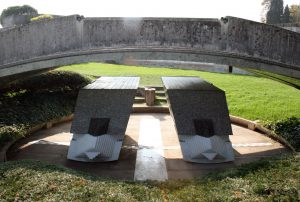The new film by Leonardo Di Costanzo, presented Out of Competition at the 78th Venice Film Festival, is already in our cinemas since 14 September. Ariaferma has among the protagonists, together with Toni Servillo and Silvio Orlando, Fabrizio Ferracane, a theater and cinema actor who in recent times is increasingly loved by audiences and directors. His career is long but the love at first sight for him came with Anime Nere by Francesco Munzi, based on the book of the same name by Giocchino Criaco – even if his debut on the big screen is to be linked to Malena (1999) by Giuseppe Tornatore. In Anime Nere (2014) Fabrizio Ferracane played the role of Luciano, a man dedicated to the care of animals and the dead and far from the culture of feuds, unlike his two brothers. The film is set in Africo, with return trips between Calabria and Milan. A story that has the dramaturgy of the real Greek tragedy: a son who makes a mistake that falls on a father, but even before that another father who makes a mistake that covers entire generations. After several films, Fabrizio Ferracane is now a recognizable face even abroad. Many remember him for his performance as an actor also in Marco Bellocchio’s Il Traditore, presented at the 2019 Cannes Film Festival. And 2021 was a lucky year for him. We saw it at the cinema in the summer months, first in School of Mafia by Alessandro Pondi, a comedy and satire on mafia education, and immediately after in La terra dei figli by Claudio Cupellini, a dystopian tale based on the graphic novel of the same name by Gipi, a world perhaps without hope in which the memories no longer exist. At the Venice Film Festival, 2021 edition, Fabrizio Ferracane participated with two different films, one precisely Ariaferma, the other is Il Paradiso del Pavone by Laura Bispuri presented in the Horizons section. If the first is a film with a suspended tone and dimension, the second is a familiar fable where non-listening governs, in which Ferracane plays a completely different role from the previous ones, an eternal and joker Peter Pan. But returning to Ariaferma… the story takes place in an old nineteenth-century prison, located in an inaccessible and unspecified area of the Italian territory. It is a decommissioned prison. Due to bureaucratic problems, transfers are blocked and a dozen prisoners remain, with few agents, waiting for new destinations. In a suspended atmosphere, the rules of separation are loosened and new forms of relationships can be glimpsed among the remaining men. “The Mortana prison does not exist in reality: it is an imaginary place, built after visiting many prisons” says Di Costanzo. “Almost everywhere we have found great willingness to talk, to tell each other; it happened that the meetings involved agents, management and some prisoners together. At that time it was easy to create a strange atmosphere of conviviality, they almost competed in telling stories. We laughed too. Then, when the meeting ended, everyone returned to their roles and the men in uniform, turnkey, took the other prisoners back to the cells. Faced with this drastic return to reality, we outsiders felt disorientation”.
The director has cut out a very interesting character for Ferracane, disenchanted and strongly attached to the univocal reality. A man unable to see other than what is indicated and required. A character destined to remain in the mind of those who watch the film motivatedly. “Leonardo Di Costanzo absolutely wanted me, he called me because he had fallen in love with me in Anime Nere and since then he hasn’t stopped following me”, says Fabrizio Ferracane. “My character in Ariaferma has a definite color, he is very clear. He does not want to compromise with a sensitivity, with an openness. He had a command and wants to carry out the order he had. For this reason, with an impressive constancy, he goes against the character of Servilo. We wanted a break with Leonardo Di Costanzo; my character, so cold and unshakable, had to be a witness to a sensitivity. Witness of the stories and souls that came out of the cages also groping. People, human beings who, despite being closed, carried with them a testimony, a story”. And he adds, “In my opinion, this is a necessary film because the situation in Italian prisons needs a review of the methods. There is a desire for re-education, for a new possibility. Re-education must be effective so that certain gestures are not repeated, so that these people do not go back to crimes”. Fabrizio Ferracane is a simple actor, in the beautiful sense of the term. With his job he tries to give others something without expecting anything. He is characterized by humility and the quality of listening, towards the text he has to bring to the stage, towards the actor he has to wear and towards the director who guides him in the story.













